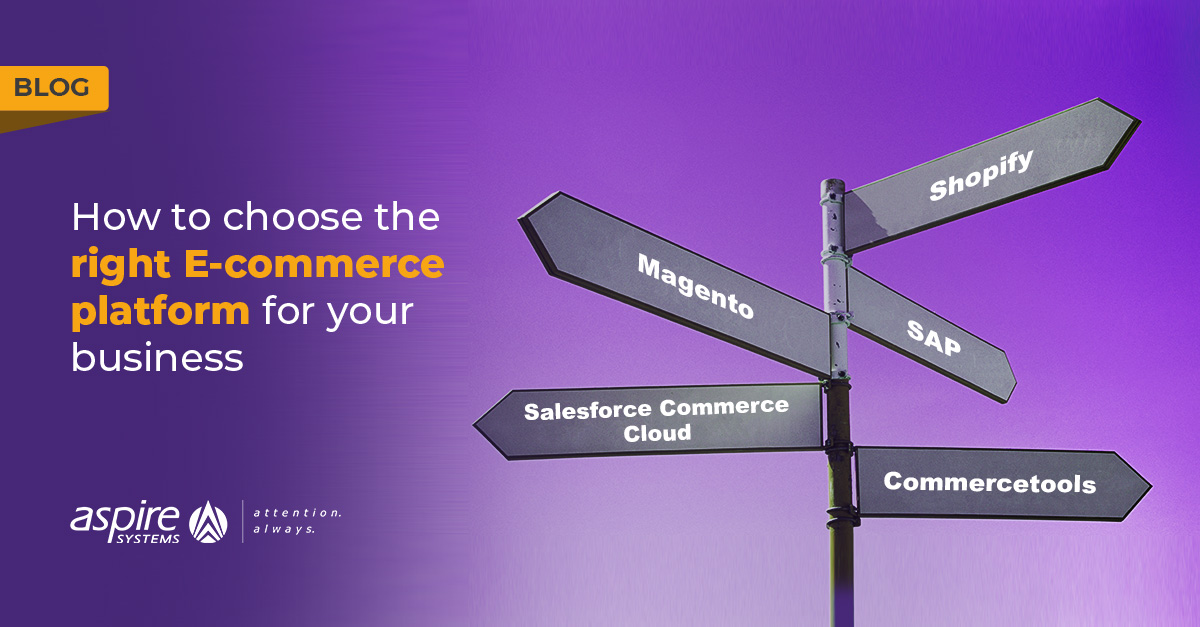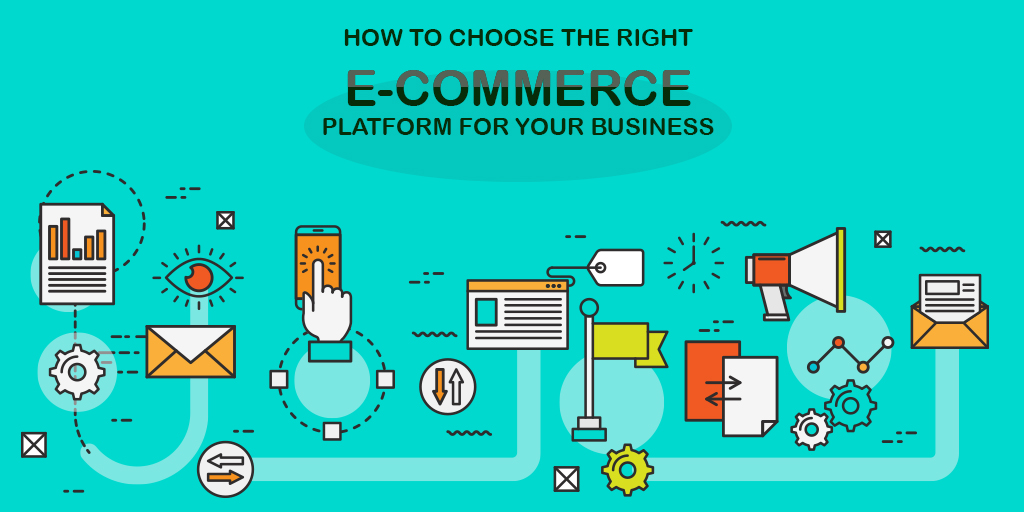Choosing the right e-commerce platform is crucial for your online business. It can impact your success, sales, and customer experience.
Starting an e-commerce business can be exciting yet daunting. With many platforms available, finding the best fit can seem overwhelming. Your choice will affect your website’s performance, user experience, and overall growth. From ease of use to customization options, each platform offers different features.
Some cater to small businesses, while others are better for large enterprises. Understanding your needs and goals is key to making the right decision. In this blog post, we will guide you through essential factors to consider. By the end, you will feel confident in selecting the best e-commerce platform for your business. Let’s dive in and explore what you need to know.

Credit: blog.aspiresys.com
Assessing Business Needs
Before selecting the right e-commerce platform, it’s crucial to assess your business needs. This ensures the platform aligns with your goals and supports your growth. Understanding these needs helps in making an informed decision that can boost your online presence and sales.
Identifying Business Goals
Start by clearly defining your business goals. Ask yourself:
- What are your short-term and long-term objectives?
- Do you aim to increase sales or improve customer engagement?
- Are you looking to expand your product range?
Understanding these goals helps in choosing a platform that supports your ambitions. For example, if you plan to scale up, you need a platform that can handle high traffic and a large inventory.
Understanding Target Audience
Knowing your target audience is essential. Consider the following aspects:
- Who are your customers? Define their age, gender, and interests.
- What are their shopping habits? Do they prefer mobile or desktop shopping?
- Where are they located? Local, national, or international customers?
These factors influence the features you need in an e-commerce platform. For instance, a mobile-friendly platform is crucial if your customers prefer shopping on their phones.
By assessing your business needs, identifying your goals, and understanding your audience, you can select an e-commerce platform that fits perfectly with your vision.
Need more clarity on E-commerce? This post provides the answers you're seeking. E-Commerce Platform Comparison for Beginners: Best Picks 2024
Budget Considerations
Choosing the right e-commerce platform involves many factors. One of the most important is budget considerations. Understanding initial costs and long-term expenses can help you make an informed decision. Let’s break down these cost factors.
Initial Costs
Initial costs are the expenses you face at the start. These include:
- Platform Fees: Some e-commerce platforms charge a setup fee.
- Design and Development: Customizing your online store may need a designer or developer.
- Hosting: If you choose a self-hosted platform, you’ll need to pay for web hosting.
- Plugins and Extensions: Extra features often come with a price tag.
Compare different platforms to see what fits your budget. Here is a table to illustrate the potential initial costs:
| Expense Type | Estimated Cost |
|---|---|
| Platform Fees | $0 – $500 |
| Design and Development | $500 – $5,000 |
| Hosting | $10 – $100/month |
| Plugins and Extensions | $0 – $300 each |
Long-term Expenses
Long-term expenses are recurring costs. These can add up over time. Consider these factors:
- Subscription Fees: Monthly or annual fees for using the platform.
- Transaction Fees: Some platforms take a percentage of each sale.
- Maintenance: Regular updates and fixes to keep your store running smoothly.
- Marketing: Ongoing costs for SEO, ads, and promotions.
It’s important to factor in these recurring costs. Below is a list of common long-term expenses:
- Subscription Fees: $29 – $299/month
- Transaction Fees: 0% – 3% per sale
- Maintenance: $50 – $500/month
- Marketing: $100 – $1,000/month
By understanding both initial and long-term costs, you can choose a platform that fits your budget. This helps ensure the sustainability of your e-commerce business.
Platform Features
Choosing the right e-commerce platform is crucial for your online business. The features offered by the platform can significantly impact your store’s success. Understanding both essential and advanced features will help you make an informed decision.
Essential Features
Every e-commerce platform should have some basic features. These are non-negotiable for smooth operation and customer satisfaction.
First, look for user-friendly navigation. Your customers should find products easily. A simple, clean layout enhances the shopping experience.
Next, ensure secure payment gateways. Customers need to trust that their payment information is safe. Look for platforms that support multiple payment options like credit cards and digital wallets.
Inventory management is another critical feature. It helps you track stock levels in real-time. This prevents overselling and stockouts.
Also, ensure the platform offers mobile responsiveness. Many customers shop using their phones. Your store should look good and function well on all devices.
Enhance your knowledge on E-commerce by exploring this related piece. Top E-Commerce Platforms for Dropshipping: Ultimate Guide 2024
Advanced Features
Advanced features can give your store a competitive edge. These features go beyond the basics to offer enhanced functionality.
One such feature is SEO tools. Good SEO can improve your store’s visibility in search engines. Look for platforms with built-in SEO capabilities like meta tags and sitemaps.
Another advanced feature is integration with third-party apps. These apps can expand your store’s functionality. For example, CRM systems, email marketing tools, and social media integration.
Consider platforms that offer detailed analytics. Analytics provide insights into customer behavior and sales trends. This data helps you make informed business decisions.
Lastly, check for multi-language and multi-currency support. This is crucial if you plan to sell internationally. It makes shopping easier for customers from different regions.
Ease Of Use
Choosing an e-commerce platform can be overwhelming. One key factor to consider is ease of use. A platform that is easy to use saves time and reduces stress. Let’s explore what makes an e-commerce platform user-friendly.
User-friendly Interface
A user-friendly interface is crucial for managing your online store. It should be intuitive and easy to navigate. Look for a dashboard that displays key information clearly. This helps you manage your store without hassle. Avoid platforms that require extensive training or tech skills.
Customization Options
Customization is important for creating a unique online store. Your platform should offer flexible design options. This allows you to match your brand’s style. Look for easy-to-use templates and drag-and-drop features. These tools make customization simple, even for beginners.
Scalability
Choosing the right e-commerce platform is crucial for your business’s success. Scalability is one of the most important factors to consider. As your business grows, your platform should be able to handle the increased traffic and transactions. Below, we dive into two key aspects of scalability: Handling Growth and Future-Proofing.
Handling Growth
Your e-commerce platform should be able to handle growth without compromising performance. This is vital for maintaining a smooth customer experience. Consider the following features:
- Load Balancing: Ensure the platform can distribute traffic evenly.
- Flexible Storage: The platform should offer scalable storage solutions.
- Efficient Checkout: A fast and reliable checkout process is essential.
- Robust Analytics: Detailed analytics help you understand traffic patterns.
These features help your platform manage increased traffic and sales, ensuring your site remains responsive and user-friendly.
Explore the depths of E-commerce with this informative post. Features to Look for in an E-Commerce Solution: Essential Guide
Future-proofing
Future-proofing your e-commerce platform is about preparing for long-term growth. Here are some key points to consider:
- API Integrations: Ensure the platform supports third-party integrations.
- Regular Updates: Choose a platform that provides regular updates and security patches.
- Customizability: The platform should allow for easy customization as your needs evolve.
- Scalable Infrastructure: Opt for cloud-based solutions that can grow with your business.
These elements ensure that your e-commerce platform can adapt to technological advancements and changing market demands.

Credit: dunnsolutions.com
Security
Security is a key factor when selecting an e-commerce platform. Protecting your customers’ data and ensuring compliance with regulations should be top priorities. A breach in security can damage your reputation and lead to financial losses. Let’s explore the crucial aspects of security:
Data Protection
Ensure the platform offers robust encryption for data storage and transmission. Look for SSL certificates, which secure the connection between your website and the user’s browser. A secure platform will also have features like two-factor authentication. This adds an extra layer of protection for your customers’ accounts.
Regular security updates are important. A platform that frequently updates its security protocols can better protect against new threats. Check if the platform provides regular backups. Backups help in recovering data in case of a security breach.
Compliance Requirements
Your e-commerce platform must comply with legal and industry standards. This includes GDPR, PCI-DSS, and other regulations. Non-compliance can lead to heavy fines and legal issues.
Ensure the platform meets all necessary compliance requirements. This helps in building customer trust and avoiding legal troubles. Check if the platform offers tools to help manage compliance requirements. This makes it easier to keep your store compliant.
Customer Support
Choosing the right e-commerce platform involves many factors. One critical aspect is customer support. Good customer support can make or break your e-commerce experience. It ensures that issues are resolved quickly, minimizing downtime and keeping your business running smoothly.
Support Availability
Check if the platform offers 24/7 support. Problems can arise at any time. Having access to support at all hours is crucial. Look for multiple support channels such as:
- Live Chat
- Phone
- Community Forums
Availability across different time zones is also important for global businesses. Ensure the support team can assist you whenever you need help.
Quality Of Service
The quality of customer support is just as important as availability. Look for platforms with knowledgeable support staff. They should be able to resolve issues quickly and efficiently. Consider the following:
- Response Time
- Resolution Time
- Customer Reviews
- Technical Expertise
Reading customer reviews can provide insight into the quality of service. Quick and effective support can save you time and reduce frustration.
In summary, strong customer support is vital. It ensures smooth operation and quick resolution of problems. Always consider support availability and quality of service when choosing an e-commerce platform.

Credit: www.credencys.com
Frequently Asked Questions
What Is An E-commerce Platform?
An e-commerce platform is a software solution that allows businesses to create and manage an online store. It supports the sale of products and services, payment processing, and order management.
How Do I Choose An E-commerce Platform?
To choose an e-commerce platform, consider your business needs, budget, scalability, and features. Evaluate user-friendliness, integration options, and customer support.
Which E-commerce Platform Is Best For Beginners?
For beginners, Shopify and WooCommerce are popular choices. They offer user-friendly interfaces and extensive support. Both are ideal for small to medium-sized businesses.
What Features Are Essential In An E-commerce Platform?
Essential features include easy product management, secure payment gateways, mobile responsiveness, SEO tools, and reliable customer support. Integration with marketing tools and analytics is also important.
Conclusion
Choosing the right e-commerce platform is crucial for your business success. Focus on your business needs and budget. Compare features and ease of use. Check customer support and integration options. Test the platform with a free trial. Make sure it can grow with your business.
Remember, the best platform meets your unique needs. Happy selling!











